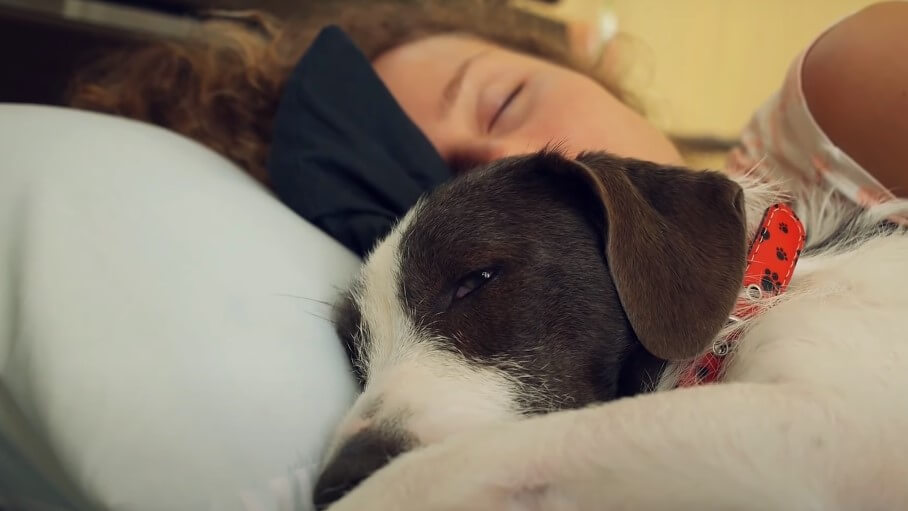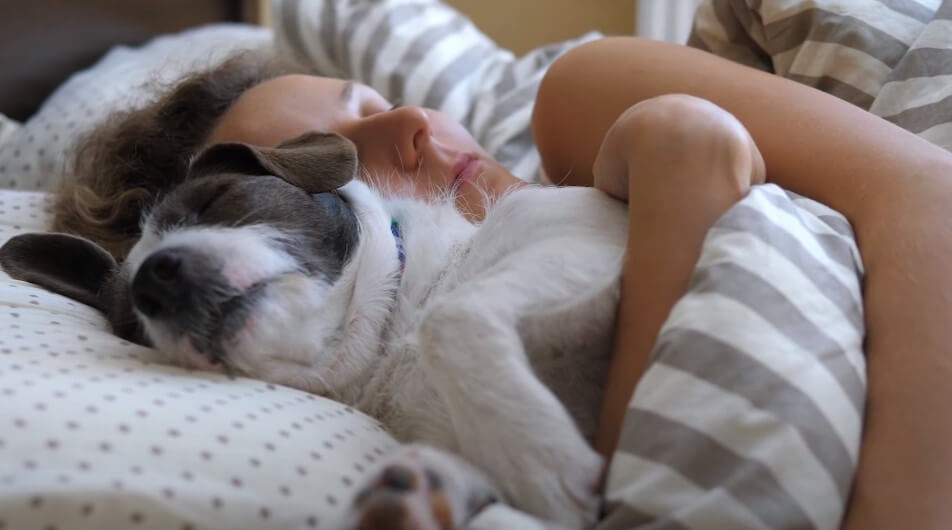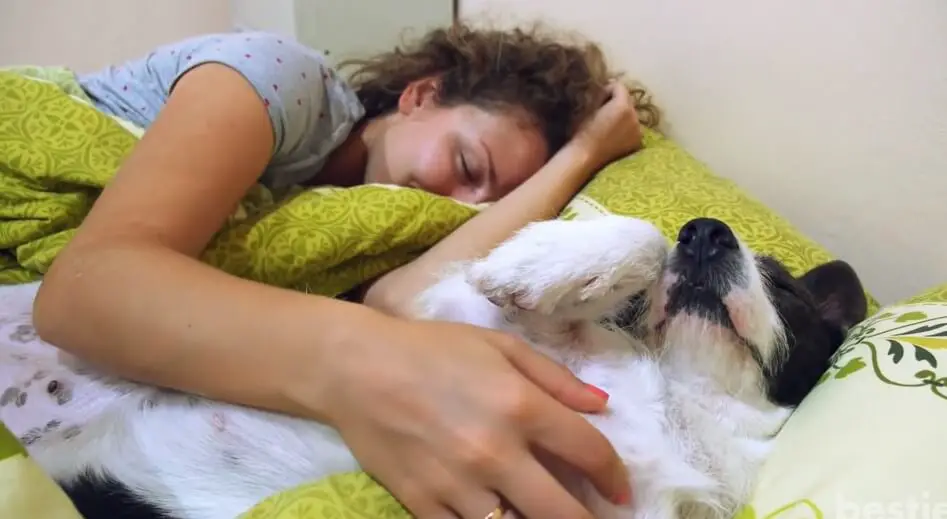Giving your dog a treat before bed can encourage good behavior and reinforce a positive bedtime routine. A treat can serve as a reward for following commands and settling down for the night, potentially leading to a calm and restful sleep.
Additionally, it can help create a positive association wit h bedtime, making it easier to get your dog settled in for the night. Remember to choose a treat that is appropriate for your dog’s size and dietary needs, and avoid giving excessive treats that may lead to weight gain or upset stomach.
Regular exercise and mental stimulation are also essential for overall sleep quality and well-being, so ensure your dog is receiving proper physical and mental stimulation throughout the day.
Benefits Of Giving Your Dog A Delicious Treat Before Bed
Promotes relaxation and sleep:
- Giving your dog a tasty treat before bed can help promote relaxation and calmness. This is especially beneficial for dogs that tend to be anxious or restless at night.
- Treating your dog before bed triggers the release of feel-good neurotransmitters, such as serotonin, which can help induce a sense of relaxation and ease them into a peaceful sleep.
- The act of chewing on a delicious treat can also provide a form of mental stimulation and help tire your dog out, making it easier for them to drift off to sleep.
Helps with training and behavior reinforcement:
- Offering your dog a treat before bed can be a valuable tool for training and reinforcing positive behavior. By associating the treat with bedtime, you can encourage your dog to follow a routine and establish good bedtime habits.
- Using treats as rewards for desired behaviors before bed can help reinforce those behaviors, making them more likely to be repeated in the future.
- Consistently giving treats before bed can also help create positive associations with bedtime, making it a more enjoyable and anticipated part of your dog’s day.
Provides a positive end to the day:
- Giving your dog a delicious treat before bed provides a positive end to their day and can help create a sense of comfort and security.
- It can serve as a signal that bedtime is approaching, helping your dog understand that it’s time to wind down and relax.
- A yummy treat can also be a way to bond with your furry friend before heading off to sleep, strengthening your relationship and reinforcing the bond between you.
Remember, moderation is key when giving treats to your dog before bed. Choose treats that are suitable for their size and dietary needs, and always consult with your veterinarian if you have any concerns.
With the right approach, giving your dog a delicious treat before bed can be a beneficial and enjoyable routine for both of you.
So go ahead, spoil your four-legged friend with a bedtime treat!
Factors To Consider Before Giving Your Dog A Treat

Age and health condition:
- Age: The age of your dog plays a significant role in determining whether it is suitable to give them treats before bed. Puppies have different nutritional requirements compared to adult or senior dogs. Consider their age to ensure you are providing the right treats that meet their specific needs.
- Health condition: Dogs with certain health conditions may require dietary restrictions. Before giving your dog a treat before bed, it is important to consider their health. If your dog has any medical issues, consult with your veterinarian to ensure the treats will not have any adverse effects.
Dietary restrictions and allergies:
- Dietary restrictions: Some dogs may have dietary restrictions due to medical conditions or allergies. If your dog is on a special diet or has specific dietary restrictions, it is essential to choose treats that align with their dietary needs. Avoid giving them treats that contain ingredients they are allergic to or that could potentially trigger their medical condition.
- Allergies: Just like humans, dogs can have allergies too. It is crucial to be aware of any food allergies your dog may have before giving them a treat before bedtime. Common allergens for dogs include grains, certain proteins, and dairy products. Check the ingredients of the treats to ensure they do not contain any allergens that could cause an adverse reaction.
Treat size and ingredients to avoid:
- Treat size: The size of the treat you give your dog before bed is important. It should be appropriate for their size and breed. A treat that is too big can pose a choking hazard, while treats that are too small may not provide enough satisfaction. Consider the size of your dog and choose treats accordingly.
- Ingredients to avoid: Some ingredients commonly found in dog treats can be harmful to your canine companion. Avoid treats that contain artificial colors, preservatives, or excessive amounts of sugar and salt. Additionally, certain ingredients, such as chocolate, onions, grapes, and nuts, should be avoided altogether as they can be toxic to dogs.
Remember, it is always best to consult with your veterinarian before introducing any new treats into your dog’s diet. They can provide guidance based on your dog’s specific needs and ensure the treats are both safe and enjoyable for your furry friend.
Best Treat Options For Dogs Before Bed
Giving your dog a treat before bed can be a great way to show them love and improve their overall well-being. However, not all treats are suitable for this purpose. To ensure you’re making the best choice for your furry friend, consider these options:
Natural And Low-Calorie Treats
- Opt for treats made with natural ingredients to avoid any potential health risks from artificial additives or preservatives.
- Look for treats specifically formulated for bedtime that contain low-calorie ingredients to prevent weight gain.
- Treats with fruits and vegetables can also be a nutritious option, packed with vitamins and minerals.
Treats With Calming Ingredients Like Chamomile Or Lavender
- Chamomile and lavender are known for their calming properties, making them ideal for dogs who struggle with anxiety or have trouble settling down at night.
- Look for treats infused with chamomile or lavender extract to help create a sense of relaxation.
- These soothing ingredients can help your dog have a more peaceful and restful sleep.
Dental Treats For Oral Health Benefits
- Dental health is crucial for dogs, and bedtime can be the perfect time for some extra dental care.
- Opt for dental treats that are specially designed to promote oral health by reducing plaque and tartar buildup.
- These treats can also help freshen your dog’s breath, making bedtime cuddles more enjoyable for both of you.
Remember to always consult with your veterinarian before introducing any new treats into your dog’s diet, especially if they have any dietary restrictions or health concerns. Incorporating these treat options into your dog’s bedtime routine can provide them with a tasty reward while promoting their overall wellness.
So, go ahead and give your furry friend a delicious treat before bed, knowing that you’re making a thoughtful and informed choice.
Tips For Introducing Treats Into Your Dog’s Bedtime Routine
The bedtime routine for your canine companion is a special time where you can strengthen the bond between you and your furry friend. One way to enhance this nightly ritual is by incorporating treats into the routine. Treats can be used as a reward for good behavior and can make bedtime a positive experience for your dog.

However, it’s important to introduce treats into your dog’s bedtime routine in a responsible and balanced way. Here are some tips to help you get started:
Start With Small Portions
- Begin by offering your dog small portions of treats before bedtime. This allows you to gauge their response and ensure they are not overindulging.
- Use treats that are specifically designed for nighttime consumption, such as dental chews or calming treats. These types of treats are formulated to promote a calm and relaxed state, making them ideal for bedtime.
Monitor Your Dog’s Response And Behavior
- After introducing treats into your dog’s bedtime routine, closely observe their response and behavior. Look for signs of discomfort, digestive distress, or any changes in their sleeping patterns.
- If you notice any negative reactions or sensitivities to specific treats, discontinue use and consult your veterinarian for alternative options.
Use Treats As A Reward For Good Bedtime Behavior
- Treats can be an effective tool to reinforce positive bedtime behavior. For example, if your dog settles down quickly and remains calm during the bedtime routine, reward them with a small treat.
- It’s essential to ensure that treats are given as a reward and not as a bribe for your dog to go to bed. This reinforces the idea that good bedtime behavior is rewarded, encouraging them to continue these positive habits.
Incorporating treats into your dog’s bedtime routine can be a wonderful way to create a positive experience for both you and your furry friend. By starting with small portions, monitoring their response, and using treats as a reward for good bedtime behavior, you can establish a healthy and enjoyable nighttime routine that your dog will look forward to each night.
Potential Risks Of Giving Your Dog A Treat Before Bed
Giving your dog a treat before bed might seem like a harmless and loving gesture, but there are potential risks that you should be aware of. While the occasional treat can be a nice way to show your furry friend some extra affection, it’s important to consider the impact it may have on their health and behavior.
In this section, we will explore the potential risks of giving your dog a treat before bed, including weight gain and obesity, excessive begging or attention-seeking behavior, and digestive issues or allergies.
Weight Gain And Obesity:
- Offering treats before bedtime can contribute to weight gain and obesity in dogs.
- Treats are often high in calories and can easily disrupt a well-balanced diet and exercise routine.
- Obesity can lead to various health problems, including cardiovascular issues and joint pain.
- Overfeeding treats can also lead to an unhealthy dependence on food for comfort, rather than seeking other forms of affection or stimulation.
Excessive Begging Or Attention-Seeking Behavior:
- Consistently giving treats before bed can create a habit of begging and seeking attention.
- Dogs quickly learn that begging results in rewards, and this behavior can become persistent and bothersome.
- It can be difficult to enjoy a peaceful evening or meal without being constantly pestered by a dog looking for treats.
- This can also reinforce unhealthy behaviors and disrupt training efforts.
Digestive Issues Or Allergies:
- Some dogs may have digestive sensitivities or allergies that can be aggravated by certain treats.
- Introducing new treats before bedtime increases the risk of digestive upset or allergies during the night.
- Owners may wake up to accidents or find their dog experiencing discomfort due to an adverse reaction.
- It is crucial to monitor your dog closely and consult with a veterinarian if you notice any signs of digestive distress or allergic reactions.
It’s important to strike a balance when it comes to treating your dog. While the occasional bedtime treat can be a special treat, it’s essential to consider the potential risks mentioned above. Taking your dog’s individual health, dietary needs, and behavior into account will help you make the best decision for their overall well-being.
Alternative Bedtime Routine Ideas For Dogs
Having a bedtime routine for your dog can provide a sense of security and relaxation, helping them wind down before sleep. While giving your furry friend a treat before bed is a common practice, there are other alternative rituals that can promote a peaceful slumber.
Here are a few ideas to consider:
Gentle Massage Or Grooming Session:
- Gently massage your dog’s muscles, using long, soothing strokes to promote relaxation.
- Pay special attention to areas like the neck, shoulders, and back.
- Use this time to check for any lumps, bumps, or skin irritations that may require veterinary attention.
- Alternatively, you can indulge your dog in a calming grooming session, brushing their fur and removing any tangles or mats.
Interactive Toys Or Puzzles:
- Engage your dog with interactive toys or puzzles designed to mentally stimulate them.
- These toys often require problem-solving skills, encouraging your furry friend to focus and tire out their mind before bedtime.
- Be sure to choose toys appropriate for your dog’s size and breed, avoiding any that may pose a choking hazard.
Relaxing Music Or Aromatherapy:
- Create a serene environment for your dog by playing soft, calming music.
- Many platforms offer playlists specifically curated for dogs, featuring soothing melodies and sounds of nature.
- Additionally, consider incorporating aromatherapy into their bedtime routine.
- Certain scents, such as lavender or chamomile, have calming properties that can help relax your dog.
Remember, each dog is unique, so it may take some trial and error to find the perfect alternative bedtime routine that suits your furry friend. By exploring these gentle rituals, you can enhance their overall sleep quality and ensure they wake up refreshed and ready for the day ahead.
FAQ Of Should I Give My Dog A Treat Before Bed
Can I Give My Dog A Treat Before Bed?
Yes, you can give your dog a treat before bedtime. However, make sure the treat is appropriate for your dog’s size and health needs. It’s important not to overfeed them, so consider the treat’s calorie content and consult your veterinarian if you have concerns.
Are There Any Benefits To Giving My Dog A Treat Before Bed?
Providing a small treat before bedtime can be a positive experience for your dog. It can help establish a bedtime routine, provide mental stimulation, and create a sense of comfort and relaxation. Just ensure the treat is suitable for your dog’s dietary requirements.
Can Giving My Dog A Treat Before Bed Affect Their Sleep?
In most cases, giving your dog a treat before bed should not affect their sleep. However, some dogs may become more active or experience digestive issues after eating. Monitor your dog’s behavior and consult your vet if you notice any negative effects on their sleep patterns.
Conclusion
Giving your dog a treat before bed can be a great way to show your love and appreciation for them. Not only does it provide a delicious reward, but it can also have several positive effects on their sleep and overall well-being.
By providing a small, healthy snack before bedtime, you can help relax your furry friend and promote a more restful sleep. Additionally, treats that are specifically designed for bedtime can contain calming ingredients, such as chamomile or melatonin, which can further aid in relaxation.
However, it’s essential to consider your dog’s dietary needs and overall health before introducing bedtime treats. Consulting with your veterinarian is crucial to ensure that the treats you choose are safe and suitable for your dog’s individual needs. Remember, a treat should never replace a healthy and balanced diet, and moderation is key.
So, with proper consideration, giving your dog a treat before bed can be a wonderful addition to their nighttime routine, ensuring they have sweet dreams and wake up feeling refreshed.
If you want to know more about dog so don’t miss to visit other post. thanks.










